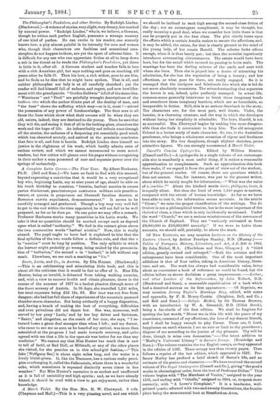The Philosopher's Pendulum, and other Stories. By Rudolph Linden. (Blackwood
.)—A volume of stories, very slight, very dreary, but marked by unusual power. "Rudolph Linden," who is, we believe, a German, though he writes such perfect English, possesses a strange mastery of one kind of pathos. He can excite in his reader, one scarcely knows how, a pity almost painful in its intensity for men and women who, though their characters are faultless and sensational cata- strophes do not happen to them, are yet the sport of adverse fates. It is difficult for any one who can appreciate fiction at all to keep down a sob in the throat as he reads the Philosopher's Pendulum, yet there is little in it, after all. A German student and teacher falls in love with a rich American girl, but says nothing and goes on teaching, till years after he falls ill. Then his love, a rich widow, goes to see him, and he finds as he dies that he might have spoken. That is all, and neither philosopher nor lady is at all carefully sketched ; yet the reader will find himself fall of sadness, and regret, and new bewilder- ment with the grand puzzle. "Gordon Baldwin" is fall of the same idea. " Weariness " and "Fred" are painfully wrought descriptions of the tedium vitce which the author thinks part of the destiny of man, and "the Seer" shows the suffering which may—or is it, must ?—attend the possession of any power of foreknowledge. The Seer sees in all faces the lines which show what their owners will be when they are old, unless, indeed, they are destined to die young. Then he sees that they will die, and seeing it first of all in the looking-glass, abandons the work and the hope of life. An indescribably sad refrain runs through all the stories, the sadness of a despairing yet essentially good mind, which has observed acutely, and arrived at the pessimist conclusion that fate is all, and fate is hostile. Rudolph Lindell does himself no justice in the slightness of his work, which hardly admits even of serious review, and which we cannot recommend to mere novel- readers, bat few critics will glance over his pages without recognising in their author a man possessed of rare and separate power over the springs of melancholy.






































 Previous page
Previous page